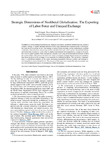
Please use this identifier to cite or link to this item:
http://ricaxcan.uaz.edu.mx/jspui/handle/20.500.11845/116Full metadata record
| DC Field | Value | Language |
|---|---|---|
| dc.contributor | 10070 | |
| dc.contributor | 102989 | |
| dc.coverage.spatial | Internacional | es_ES |
| dc.creator | Delgado Wise, Raúl | |
| dc.creator | Márquez Covarrubias, Humberto | |
| dc.date.accessioned | 2017-04-21T01:59:04Z | |
| dc.date.available | 2017-04-21T01:59:04Z | |
| dc.date.issued | 2012-06 | |
| dc.identifier | info:eu-repo/semantics/publishedVersion | |
| dc.identifier.issn | 2165-4328 | es_ES |
| dc.identifier.issn | ESSN: 2165-4336 | es_ES |
| dc.identifier.uri | http://hdl.handle.net/20.500.11845/116 | |
| dc.description.abstract | In addition to environmental degradation and financial speculation, neoliberal globalization has created a complex strategy of capital internationalization led by large multinational corporations that is driving la- bor costs down to extreme levels. This strategy is based, on the one hand, on the establishment of global commodity chains based on outsourcing schemes and intra-firm trade, which operate in peripheral nations and in the form of enclaves; on the other, it employs international labor migration as a means to lower la-bor costs in central countries. Both mechanisms comprise a new rung in the international division of labor: the export of labor. This process has led to new forms of unequal exchange that are much more predatory than those involved in the exchange of raw materials for industrial products. This has led to a reintegra-tion of a subordinate periphery to the center, increasing asymmetries between countries and pushing so-cial inequality to unprecedented levels. The purpose of this paper is to empirically and conceptually ana-lyze these fundamental aspects of contemporary global architecture. | es_ES |
| dc.language.iso | eng | es_ES |
| dc.publisher | Scientific Research | es_ES |
| dc.relation | http://www.scirp.org/Journal/PaperInformation.aspx?PaperID=20181 | es_ES |
| dc.relation.ispartof | http://www.scirp.org/journal/aasoci/ | es_ES |
| dc.relation.uri | generalPublic | es_ES |
| dc.rights | Attribution-NonCommercial-ShareAlike 3.0 United States | es_ES |
| dc.rights.uri | http://creativecommons.org/licenses/by-nc-sa/3.0/us/ | * |
| dc.source | Advances in Applied Sociology, vol. 2, no. 2, pp. 127-134 | es_ES |
| dc.subject.classification | CIENCIAS SOCIALES [5] | es_ES |
| dc.subject.other | info:eu-repo/classification/Labor Export | |
| dc.subject.other | info:eu-repo/classification/Unequal Exchange | |
| dc.subject.other | info:eu-repo/classification/Uneven Development | |
| dc.subject.other | info:eu-repo/classification/Neoliberal Globalization | |
| dc.subject.other | info:eu-repo/classification/Crisis | |
| dc.subject.other | info:eu-repo/classification/Intercambio desigual | |
| dc.subject.other | info:eu-repo/classification/Desarrollo | |
| dc.subject.other | info:eu-repo/classification/Neoliberalismo | |
| dc.subject.other | info:eu-repo/classification/Globalización | |
| dc.title | Strategic dimensions of neoliberal globalization: The exporting of labor force and unequal exchange | es_ES |
| dc.type | info:eu-repo/semantics/article | es_ES |
| Appears in Collections: | *Documentos Académicos*-- UA Estudios del Desarrollo | |
Files in This Item:
| File | Description | Size | Format | |
|---|---|---|---|---|
| RDW-HM AASoci20120200006_51128592.pdf | Versión publicada | 327,68 kB | Adobe PDF |  View/Open |
This item is licensed under a Creative Commons License
